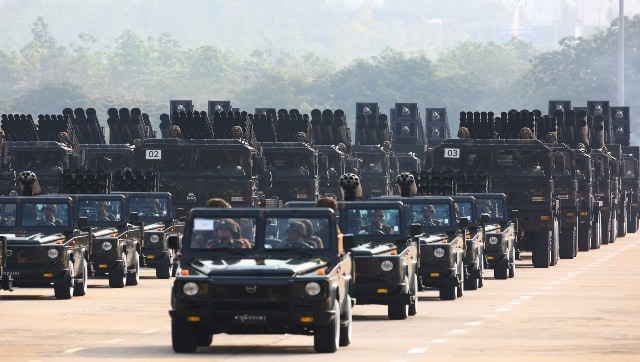Myanmar military imported weaponry worth $1 billion since 2021 coup: UN report
Myanmar's military regime procured over $1 billion worth of arms and raw materials for weapons production from international suppliers since it ousted a democratically-elected regime in February 2021, a probe by a UN-linked body has found

Myanmar military officers leave the venue during a parade to commemorate Myanmar's 78th Armed Forces Day in Naypyitaw, Myanmar, on 27 March, 2023. AP File
Myanmar’s military regime has procured over $1 billion worth of arms and raw materials for weapons production from international suppliers since it ousted a democratically-elected government in February 2021, a 10-month investigation by a United Nations-linked body has found.
According to Nikkei Asia report, citing the investigation led by Tom Andrews, UN special rapporteur on the situation of human rights in Myanmar, Russia, China, Singapore, India and Thailand were top suppliers to the military.
The exports cover weapons, dual-use technology and materials used to manufacture weapons exported from the day of the coup on 1 February, 2021, to December 2022.
“These weapons, and the materials to manufacture more of them, have continued to flow uninterrupted to the Myanmar military despite overwhelming evidence of its responsibility for atrocity crimes,” Al Jazeera report quoted Andrews as saying in a report released on Wednesday in New York.
It identified more than 12,500 unique purchases or recorded shipments directly to the Myanmar military or known Myanmar arms dealers working on the military’s behalf.
“The diversity and volume of goods provided to the Myanmar military since the coup is staggering,” the report added, saying the military had taken delivery of weapons and equipment from fighter jets to drones, communications equipment and components for navy ships.
Dramatic increase in military spending
Detailed tracking of materiel purchases also highlight the dramatic increase in military spending under the regime led by the State Administration Council since its power grab on 1 February, 2021.
The government approved in April a military budget of more than 5.6 trillion kyat ($2.7 billion) for the year to 31 March, 2024, up from 3.7 trillion kyat previously.
According to the report, Russia and China remained to be the primary suppliers of cutting-edge weaponry to Myanmar’s military in 2022–2023, accounting for nearly $406 million and $267 million in such shipments, respectively, since 2021.
Singapore shipped $254 million of military-related materials from dozens of its entities to the Myanmar military between February 2021 and December 2022.
India notched up about $51 million worth of military-related exports to Myanmar since February 2021 while Thailand accounted for about $28 million worth of sales in the same period.
Some of the countries named in the report had been responsive to the investigations, said Andrews in the report.
Call for ban on weapon’s transfer
Andrews called for a complete ban on the sale or transfer of weapons to Myanmar’s military and urged UN member states to enforce existing ones.
He said these countries could do more to stop the arms flow, including by targeting the regime’s key revenue sources, fully enforcing existing prohibition measures, and establishing and enforcing comprehensive sanctions on procurement networks.
He also highlighted Japan, New Zealand and South Korea as countries that had imposed harsh sanctions on Russia over its invasion of Ukraine but had not acted on Myanmar over its persistent human rights abuses.
“I urge Japan to consider joining all other G-7 countries in imposing targeted economic sanctions on the Myanmar military and its key sources of revenue, just as it is doing in response to the crisis in Ukraine,” Andrews was quoted as saying by Nikkei Asia.
In their response, Russia and China accused the rapporteur of going beyond his mandate and “vilifying legitimate arms trade”.
India, meanwhile, said the arms contracts involving state-owned companies had been signed by a previous government.
Andrews noted that he had found no information indicating that entities owned or controlled by the governments of Singapore or Thailand, or the governments themselves, had approved or transferred the arms to the Myanmar military, and that it seemed arms dealers were using the territories to carry out their business “specifically the banking and shipping sectors”.
As a result of the report, the Singapore government indicated it was reviewing the effectiveness of its export controls, Andrews said in the report.
With inputs from agencies
Read all the Latest News, Trending News, Cricket News, Bollywood News,
India News and Entertainment News here. Follow us on Facebook, Twitter and Instagram.
